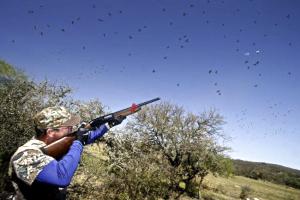Sports
Doves Plentiful, Fields Spotty For Opening Day
August 15th 2011 by Unknown

From Jim Low - The Missouri Department of Conservation
Weather has favored reproduction, but finding a good hunting spot will take legwork.
JEFFERSON CITY—Visit dove fields before opening day, and buy plenty of ammunition. That’s the advice from Missouri’s top dove expert. Resource Scientist John Schulz says Missouri doves have raised a bumper crop of young this year.
Missouri’s dove hunting season runs from Sept. 1 through Nov. 9. Mourning, collared and white-winged doves all are legal. The limit is 15 doves of all three species in the aggregate daily and 30 in possession.
Missouri residents ages 16 through 64 must buy a Small Game Hunting Permit to pursue doves. All dove hunters 16 and older must have a Missouri Migratory Bird Hunting Permit for dove hunting.
Mourning doves are amazingly prolific, raising up to six clutches of eggs between March and September. However, doves build flimsy, shallow nests, and rainy, windy weather reduces nest success. Schulz says this year’s hot, dry summer has been good for dove nesting. The evidence comes from the Missouri Department of Conservation’s dove-banding program.
“Of the 500 or so doves banded so far this year, almost 400 of them have been hatched this year,” said Schulz. “You only see proportions like that in years with excellent dove reproduction.”
Dry weather is a two-edged sword for dove hunters, however. Without adequate rainfall, food crops planted for doves at conservation areas don’t thrive. Wet weather early in the summer hampered efforts to plant sunflowers, wheat and millet on managed dove fields at conservation areas. Then the weather turned hot and dry over much of the state, preventing proper growth of dove food crops.
 Some areas had the opposite problem this year, with excessive water or outright flooding. Ten Mile Pond CA is the most notable example. Normally this area in Mississippi County provides excellent dove action. However, flooding made it impossible to plant any dove fields there this year.
Some areas had the opposite problem this year, with excessive water or outright flooding. Ten Mile Pond CA is the most notable example. Normally this area in Mississippi County provides excellent dove action. However, flooding made it impossible to plant any dove fields there this year.The good news is that with approximately 150 fields on 90 conservation areas, some are bound to have food crops to attract doves. And since dry or wet weather has reduced the availability of natural foods, doves will be more concentrated than ever on dove fields that did well. That means lots of shooting for hunters who find the right spots.
Hunters can find managed dove fields here, or by calling any Conservation Department office. Since the condition of crops varies dramatically, scouting before opening day is important for success.
“Nothing beats an on-site inspection,” said Schulz. “Hunters who put in the time necessary to find a field with good crop development get the best hunting.”
Schulz said scouting is best done in the days immediately before Sept. 1. This is because final field preparation, including disking crops to make them accessible to doves, often is done just before the season opener.
“If you go on Aug. 23, you might only see standing crops and no birds,” said Schulz. “A few days later, strips will be disked through the field, and birds will be finding the new food source.”
If you can’t get to your preferred area before Sept. 1, Schulz suggests calling the area manager and asking about conditions. Contact information for area managers is available through the Conservation Atlas database at mdc.mo.gov/atlas.
If you prefer not to join dozens of other hunters on managed dove fields, other options exist. Doves like open ground, weed seeds, perching sites and water. Any spot that combines two or more of these elements can be an excellent hunting spot. A pond with a wide margin of bare soil or mud – easy to find in this droughty year – is one possibility. Add some dead trees for perching, and you have a dove magnet.
The Conservation Department bands 2,000 to 3,000 birds annually as part of a nationwide effort to create a dove-management database. Approximately 12 percent of those doves are recovered and reported, mostly by hunters. Schulz said the most important thing dove hunters can do to improve their sport is to check every bird they shoot for a leg band and report any they find at www.reportband.gov, or by calling 800-327-BAND (2263).
“Data from band recoveries drive a wide array of analytical processes that directly affect how we establish mourning dove hunting regulations each year,” said Schulz. “By reporting band numbers, hunters are helping manage our dove resource for future generations.”

Statistics from conservation areas where the Conservation Department records the number of doves killed and the number of shots fired show that hunters fire an average of five shots per dove. If you kill a limit of 15 doves with fewer than three boxes of shotgun shells, pat yourself on the back for being an above-average wingshot. Then pick up all the empty hulls on the ground around you. Leaving them in the field is littering, and could earn you a ticket.
Dove hunters must use nontoxic shot when hunting doves or other game on 21 conservation areas with sizeable wetlands and waterfowl populations. Those areas and other details of dove hunting regulations are found in the 2011 Migratory Bird Hunting Digest, available wherever hunting permits are sold or at mdc.mo.gov/8927
Last Updated on August 15th 2011 by Unknown
https://showmetimes.com/Blogpost/ujrg/Doves-Plentiful-Fields-Spotty-For-Opening-Day
Hunter Education Course Offered
August 14th 2011 by Unknown

From Mark Reed - The Missouri Department of Conservation
The MO Department of Conservation along with volunteer instructors will present a hunter education class on August 19 and August 20 at the Dexter Elks Lodge. Course hours are 6:00 P.M. until 9:00 P.M. on August 19 and 8am until 5pm on August 20. Participants must attend both sessions and successfully complete a test on Saturday.
Online registration is required at www.mdc.mo.gov. There are seats available in this class and we are still accepting registrations. If you have difficulty completing online registration, please contact the Cape Girardeau Regional Office at 573-290-5730.
Participants must be at least eleven years of age. Please bring proof of age and any hunting or fishing permits you have purchased in the past so we can complete class paperwork.
On Saturday, frequent breaks will be given and the Elks will have snacks, sodas, and coffee available. Lunch will also be available from the Elks for a nominal fee.
In order to purchase any Missouri firearms hunting permit, folks born since January 1, 1967, must complete a hunter education course and present proof of the course to a permit vendor.
If you are unable to complete the course in time but still would like to try hunting, you may purchase an Apprentice Hunter Authorization, then purchase the appropriate hunting permit for the season you wish to participate in. The Apprentice Hunter Authorization allows a person to hunt without hunter education, but they must be in the immediate presence of a properly licensed adult who has completed hunter education or who is exempt.
Squirrel season is open and they have begun cutting hickory nuts. We have had a few cool mornings lately and some hunters have been successfully pursuing bushytails. As any squirrel hunter knows, once they start working on hickory nuts, locating squirrels in dense foilage can be a fun challenge.
Dove season opens September 1 and is the annual kick-off to the fall hunting seasons.
Teal, as well as archery deer and turkey, follow soon after, and hunters will have plenty to keep them busy. Wildlife population estimates look good again this year and as long as the weather cooperates, we should see a successful fall hunting season.
For more information on hunter education visit the Missouri Department of Conservation’s website, or contact me at mark.reed@mdc.mo.gov or at 573-421-3240.
Last Updated on August 14th 2011 by Unknown
https://showmetimes.com/Blogpost/ujrb/Hunter-Education-Course-Offered
Duck Blind Registration Set At Wappapello
August 14th 2011 by News

The U. S. Army Corps of Engineers at Wappapello Lake will hold the annual duck blind registration on Aug.20 at the Bill Emerson Memorial Visitor Center. Anyone wishing to place a floating blind on the lake needs to be signed up before 1 p.m. Hunters not signed up by 1 p.m. be required to wait until the drawing/placement process is completed to register and choose a location for your blind.
Blinds, which must be provided by the applicant, must meet the “Minimum Standards for Floating Duck Blinds”. Copies of the “Minimum Standards for Floating Duck Blinds” will be available the day of the drawing.
The registration fee for a duck blind is $15 and applicants must bring cash, in the exact amount, or a personal check or money order made payable to “FAO, USACE, St. Louis District”.
Persons interested in registering a duck blind and cannot attend the drawing, may contact Park Ranger Eric Limanen at (573) 222-8562, Monday through Friday, 7 a.m. to 4 p.m. following the drawing. Interested hunters may also drop by the project Office to obtain an application form and a copy of the “Minimum Standards for Floating Duck Blinds”.
Duck blinds may be placed on the lake after Sept. 6.
The Corps of Engineers also issued a reminder, that it will begin a gradual lake drawdown at Wappapello the week of Dec. 15,. and will continue to draw the lake down until it reaches conservation pool (usually by the first week of January) in accordance with established lake management standards.
Hunters are asked keep this in mind when choosing a location for placement of a duck blind.
All blinds affected by low water levels must be relocated to areas that will not become dry during the drawdown.
Photo Above: Wappapello at sunset (SMT file photo by Annabeth Miller)
Last Updated on August 14th 2011 by News
https://showmetimes.com/Blogpost/ujr4/Duck-Blind-Registration-Set-At-Wappapello
Bearcat Cross Country Rebuilds for 2011
August 14th 2011 by Staff Writer

Cross Country has only been revived as a team sport the past 5 years here in Dexter. This is a unique sport that encompasses both girls and boys divisions. Each race is on open-air courses over natural terrain. The course, typically 4–12 kilometres (2.5–7.5 mi) long,. Athletes simply run a designed long distance course which may include surfaces of grass and earth, pass through woodlands and open country, and include hills and flat ground.
It’s a pure sport of competition whereby athletes display a degree of running technique combined with the shear determination and guts to finish high. Like wrestling or tennis, cross country teams compete as both individuals and as a team.
Coach Bolin comes to the team with a wide array of experience from girl’s softball to girl’s basketball and most recently an assistant to the cross country program at Doniphan High School. Chris was an athlete himself from Doniphan where he played 4 years of baseball and even advanced to the collegiate level. Eventually, he returned to SEMO University to complete his degree. He is now employed in Dexter as the Middle School special education teacher.
The team is anchored by its returning seniors Melinda Mayo and Jenny Blattman. Both girls have been a part of the team all four years of their high school career and are expected to show true leadership among the group.
The remaining members of the girl’s team are; Samantha Midgett – JR, Selana Flannigan – SO, Katie Justice – SO, Alexis Smith – FR and Kelsi Wood – FR.
The boy’s team will be led by Junior Alex Rybolt. “Alex is a fantastic runner and has a goal of qualifying for the state meet in 2011,” added Bolin.
“Averett and Conner will most likely compete at the varsity level,” says Coach Bolin. “Both Allston and Layton are new to running and will compete at the junior varsity meets.”
The coaching staff feels that additional athletes will join the team after school begins this week and will increase the strength of the team overall.
If you wonder who the young people are that are lining Grant Street each morning the past two weeks that would be your Bearcat runners. A typical practice is about 1 to 1.5 hours and has an emphasis of leg conditioning and endurance training. The prescribed workout will include approximately 5 miles of running with speed and interval training mixed in throughout the training schedule.
The first meet for the Bearcats’ Cross Country team will be held at the Jackson Invitational on September 3rd. There are no home meets scheduled at this point, but the hope is to begin the process of developing a home course to hold meets in the future.
Photo One: 2010 Season photo with Alex Rybolt and Ryan Bagby at the starting line.
Photo Two: Senior Jenny Blattman shows her running skills in the 2010 DHS Cross Country Season.
Photo Three: Junior Alex Rybolt shown last season and will be the anchor runner for the Bearcat Boys Cross Country Team.
Make sure to check back with the ShowMe Times for updates on the Bearcat Cross Country Team.
Last Updated on August 14th 2011 by Staff Writer
https://showmetimes.com/Blogpost/ujqh/Bearcat-Cross-Country-Rebuilds-for-2011
Lady 'Cats Prepare For Tennis Season
August 13th 2011 by Unknown

By Andrew Cato, ShowMe Times Sports Editor
The DHS Lady Bearcat Tennis team has been working hard every morning for the last week preparing for their upcoming season.
“We’re going to have a dandy team this year,” head coach Leann Dooley said after practice on Friday. “We’ve got a lot of good athletes coming in, especially some of these basketball players.”
The Lady ‘Cats will resume practices on Monday afternoon, as teachers have to report for workshops at the start of the week.
Photo Above: Head coach Leanne Dooley goes over the results from the week's practice with her team Friday morning. The Lady 'Cats have been working hard preparing for the upcoming season.
Make sure to check back with the ShowMe Times for updates on the team’s progress throughout the season!
Last Updated on August 13th 2011 by Unknown
https://showmetimes.com/Blogpost/ujqe/Lady-Cats-Prepare-For-Tennis-Season

